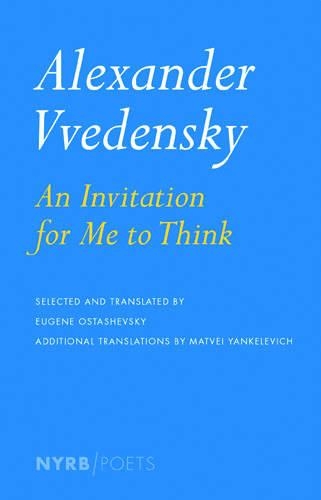
An Invitation For Me To Think
(Paperback, Main)
Publishing Details
An Invitation For Me To Think
By (Author) Alexander Vvedensky
New York Review Books
NYRB Poets
15th April 2013
23rd May 2013
Main
United States
Classifications
General
Non Fiction
891.7142
Physical Properties
Paperback
168
Width 116mm, Height 180mm, Spine 10mm
140g
Description
Alexander Vvedensky, co-founder with the poet Daniil Kharms of OBERIU, a small avant-garde collective in late-1920s Soviet Leningrad, is the least known of major Russian twentieth-century poets. He stands apart like a dark star in a constellation that includes Mandelstam, Akhmatova, Pasternak, Tsvetaeva, Mayakovsky, and Khlebnikov. Younger than these poets by a decade, Vvedensky came of age under the Soviet system, when the language used to describe reality appeared to have lost all literal meaning. He saw his task to be "the poetic critique of reason" and claimed "time, death, and God" as his main themes. His poetry is suffused with a philosophical lyricism that recalls the ending of Wittgenstein's Tractatus Logico-Philosophicus. It can also get quite hilarious: the author had a day job as a children's writer. After incarceration from 1931 to 1933 for "literary sabotage," Vvedensky kept his poetry private, sharing it only with Kharms and others in their tiny underground circle of writers and philosophers. When war broke out in 1941, the authorities rearrested the pair as potential subversives: Kharms died in a prison asylum and Vvedensky in a prison transport. Both were only thirty-seven years old. Their manuscripts were published during the collapse of the Soviet Union, half a century after the deaths of the authors; An Invitation for Me to Think is Vvedensky's first collection to appear in English and includes the now celebrated poetry of the 1930s in prizewinning translations by America's foremost OBERIU specialists.
Reviews
...it's high time that more readers pick up on [Vvedensky's] work to break language, to crush understanding so that what is beneath and beyond it can smuggle its miracle into our event-hemorrhaging lives. Asymptote Journal Unlike the Symbolists, his aim is neither to create an aesthetic paradise nor to suggest or build a bridge to another world-Vvedensky's is an aesthetics of martyred aesthetics, of not knowing, of the defeat of 'poetry' in the service of truth... His poetic sensibility combines the Russian Symbolist concern for transcendence, God, and 'other worlds,' with the Futurist orientation toward syntactical and semantic deformations that draw attention to the artifices of language. Thomas Epstein, The New Arcadia Review "a remarkable oeuvre - [Ostashevsky] and his poet-collaborator Matvei Yankelevich have done a superb job in capturing the tone and sound aura of Vvedensky's poems" Times Literary Supplement
Author Bio
ALEXANDER VVEDENSKY (1904-1941) was a major Russian poet, the founder with Daniil Kharms of the avant-garde and left-wing artist collective OBERIU, a neologism standing for the Union of Real Art. Following OBERIU's forced dissolution, Vvedensky was imprisoned and sentenced to internal exile; he was subsequently permitted to return to Leningrad and to write children's books but not to compose poetry. Soon after the Nazi invasion of the Soviet Union in 1941, Vvedensky was arrested, put on a prison train to Kazan, and died of dysentery en route. Most of Vvedensky's work has been lost. In 1980 his collected writings were published in the United States; during perestroika his work began to be published in his homeland. EUGENE OSTASHEVSKY is a Russian-born American poet from New York City. His books include OBERIU: An Anthology of Russian Absurdism and three original poetry collections: Iterature, The Life and Opinions of DJ Spinoza, and Enter Morris Imposternak, Pursued by Ironies.
